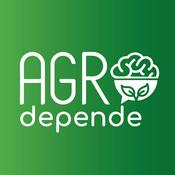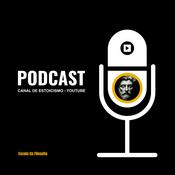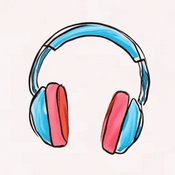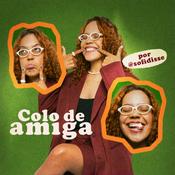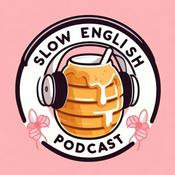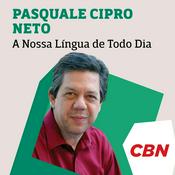377 episódios
275 Unbothered, Unmasked, and Still Showing Up: Why Neurodivergent People Do the Hard Things for Others
03/2/2026 | 25minUnbothered, Unmasked, and Still Showing Up: Why Neurodivergent People Do the Hard Things for Others
Patricia Young (she/her) explores what it means to show up for others as an AuDHDer. She reflects on value-driven behavior, executive functioning challenges, internalized ableism, grief, rest, and the deep relief of living an "unbothered life." Through personal stories about partnership, support, sensory overwhelm, initiation struggles, and authentic connection, this episode invites listeners to rethink productivity, compassion, and what real belonging looks like when we stop masking and start honoring our nervous systems.
WHAT YOU'LL HEAR IN THIS EPISODE
· Why neurodivergent people often do hard things for others but struggle to do the same things for themselves
· The difference between preference vs. values (and why values often override sensory limits)
· A real-life example of showing up for an important ritual despite overwhelm
· How gratitude and being seen can make difficult experiences feel meaningful
· The "Soup Jean" metaphor: values-based caregiving and automatic compassion
· Why some people are confused by generosity—and how that reflects differing value systems
· Letting go of mental noise and choosing an unbothered life
· OCD, intrusive thoughts, and giving your brain limited airtime instead of full control
· "Not my circus, not my monkeys" as a neurodivergent boundary tool
· Executive functioning struggles with task initiation (especially for autistic & ADHD adults)
· How supportive partners can initiate without infantilizing
· Internalized ableism and the fear of "What if I have to do this alone someday?"
· The myth that trying harder fixes ADHD and autistic challenges
· Compassion for inconsistent energy, productivity, and capacity
· Capitalism, productivity culture, and why rest feels morally loaded
· Why systems (homes for objects) matter more than willpower
· Everyday executive functioning examples (milk, groceries, unfinished tasks)
· When to step in to support vs. letting natural consequences happen
· Communicating needs during grief without over-explaining or masking
· Redefining intimacy: showing up tired, quiet, grumpy, or grieving—and still belonging
SOUND BITES
· "There are things I struggle to do for myself that I would do without hesitation for people I love—because that's my value system."
· "I don't want things taking up space in my head that don't belong to me anymore."
· "Just because I can do something one day doesn't mean I can do it the next—and that's not a moral failure."
· "Rest isn't laziness. It's information."
· "You can't screw up being you."
SENSITIVITY IS NOTHING TO APOLOGIZE FOR; IT'S HOW YOUR BRAIN IS WIRED
You are not broken. You were shaped by systems that weren't built for you. You deserve rest, joy, and support exactly as you are.
PODCAST HOST
Patricia Young (she/her) was a Licensed Clinical Social Worker for over 17 years, but she is now exclusively providing coaching. She knows what it's like to feel like an outcast, misfit, and truthteller. Learning about the trait of being a Highly Sensitive Person (HSP), then learning she is AuDHD with a PDA profile, OCD and RSD, helped Patricia rewrite her history with a deeper understanding, appreciation, and a sense of self-compassion. She created the podcasts Unapologetically Sensitive and Unapologetically AuDHD to help other neurodivergent folks know that they aren't alone, and that having a brain that is wired differently comes with amazing gifts, and some challenges. Patricia works online globally working individually with people, and she teaches Online Courses for neurodivergent folks that focus on understanding what it means to be a sensitive neurodivergent. Topics covered include: self-care, self-compassion, boundaries, perfectionism, mindfulness, communication, and creating a lifestyle that honors you
Patricia's website, podcast episodes and more: www.unapologeticallysensitive.com
LINKS
To write a review in itunes:
click on this link https://itunes.apple.com/us/podcast/unapologetically-sensitive/id1440433481?mt=2
select "listen on Apple Podcasts"
chose "open in itunes"
choose "ratings and reviews"
click to rate the number of starts
click "write a review"
Website--www.unapologeticallysensitive.com
Facebook-- https://www.facebook.com/Unapologetically-Sensitive-2296688923985657/
Closed/Private Facebook group Unapologetically Sensitive-- https://www.facebook.com/groups/2099705880047619/
Instagram-- https://www.instagram.com/unapologeticallysensitive/
Youtube-- https://www.youtube.com/channel/UCOE6fodj7RBdO3Iw0NrAllg/videos?view_as=subscriber
Tik Tok--https://www.tiktok.com/@unapologeticallysensitiv
Unapologetically AuDHD Podcast-- https://unapologeticallysensitive.com/unapologeticallyaudhd/
e-mail-- [email protected]
Show hashtag--#unapologeticallysensitive
Music-- Gravel Dance by Andy Robinson www.andyrobinson.com- The Day My Nervous System Chose Violence (Internally)
Patricia Young (she/her) explores what happens when big feelings meet medication changes, OCD spirals, and unmet needs. Through a vulnerable personal story about adjusting OCD medication, asking for support, and reacting more intensely than expected, Patricia reflects on autism, relational OCD, RSD, and trauma responses. She also discusses how to hold grief and joy at the same time, how to create meaning when life is profoundly unfair, and why it's okay to share joy without making yourself smaller. This episode is a compassionate reminder that awareness, baseline tracking, and self-permission are key tools for sensitive and neurodivergent people navigating relationships, mental health, and change.
WHAT YOU'LL HEAR IN THIS EPISODE
· Big reactions aren't character flaws — they're often signals, especially for autistic and OCD brains
· Medication changes can remove protective buffers, even when life circumstances are stable
· Asking for what you want can activate PDA, RSD, and old relational wounds
· OCD often pulls in "evidence" and tallying to justify emotional pain
· Feeling justified doesn't mean the story is accurate — it means the feelings are loud
· You can manage your behavior externally while still experiencing internal emotional chaos
· Walking, movement, and problem-solving can help — but they don't erase vulnerability
· A "hard day" doesn't mean failure — it means data
· Knowing your emotional baseline is critical when adjusting meds
· It's okay to decide that you don't want more days like that
· You don't have to accept injustice to learn how to live alongside it
· Two truths can exist at the same time: devastation and joy
· Therapy and coaching work best when clients feel safe giving feedback
· Neurodivergent-affirming practitioners change the entire therapeutic experience
· You don't have to make yourself small to protect others from discomfort
SOUND BITES
· "It wasn't about the coffee — it was about how big everything felt in my body."
· "The bigger my feelings got, the more justification my brain wanted."
· "This hasn't been my baseline — and that matters."
· "I don't think this is something you ever 'accept,' but you can still create meaning."
· "I don't want to live a life where I write people off when I'm overwhelmed."
SENSITIVITY IS NOTHING TO APOLOGIZE FOR; IT'S HOW YOUR BRAIN IS WIRED
You are not broken. You were shaped by systems that weren't built for you. You deserve rest, joy, and support exactly as you are.
CHAPTERS (PLEASE ALLOW FOR ADDITION OF INTRO)
00:00 Navigating Big Feelings and Reactions
21:13 Creating Meaning Amidst Unfairness
34:21 Embracing Joy and New Experiences
PODCAST HOST
Patricia Young (she/her) was a Licensed Clinical Social Worker for over 17 years, but she is now exclusively providing coaching. She knows what it's like to feel like an outcast, misfit, and truthteller. Learning about the trait of being a Highly Sensitive Person (HSP), then learning she is AuDHD with a PDA profile, OCD and RSD, helped Patricia rewrite her history with a deeper understanding, appreciation, and a sense of self-compassion. She created the podcasts Unapologetically Sensitive and Unapologetically AuDHD to help other neurodivergent folks know that they aren't alone, and that having a brain that is wired differently comes with amazing gifts, and some challenges. Patricia works online globally working individually with people, and she teaches Online Courses for neurodivergent folks that focus on understanding what it means to be a sensitive neurodivergent. Topics covered include: self-care, self-compassion, boundaries, perfectionism, mindfulness, communication, and creating a lifestyle that honors you
Patricia's website, podcast episodes and more: www.unapologeticallysensitive.com
LINKS
To write a review in itunes:
click on this link https://itunes.apple.com/us/podcast/unapologetically-sensitive/id1440433481?mt=2
select "listen on Apple Podcasts"
chose "open in itunes"
choose "ratings and reviews"
click to rate the number of starts
click "write a review"
Website--www.unapologeticallysensitive.com
Facebook-- https://www.facebook.com/Unapologetically-Sensitive-2296688923985657/
Closed/Private Facebook group Unapologetically Sensitive-- https://www.facebook.com/groups/2099705880047619/
Instagram-- https://www.instagram.com/unapologeticallysensitive/
Youtube-- https://www.youtube.com/channel/UCOE6fodj7RBdO3Iw0NrAllg/videos?view_as=subscriber
Tik Tok--https://www.tiktok.com/@unapologeticallysensitiv
Unapologetically AuDHD Podcast-- https://unapologeticallysensitive.com/unapologeticallyaudhd/
e-mail-- [email protected]
Show hashtag--#unapologeticallysensitive
Music-- Gravel Dance by Andy Robinson www.andyrobinson.com - The Holidays: A Group Project My Nervous System Didn't Agree To
In this New Year's episode, Patricia Young (she/her) explores why the holiday season can be especially challenging for autistic, ADHD, and AuDHD nervous systems. Through personal stories about gift giving, overstimulation, masking, PDA, rejection sensitivity, and the need for sameness and predictability, she unpacks how small changes and social expectations can quietly dysregulate neurodivergent people. The episode also includes updates on her purple hair and tattoo, reflections on attunement and fairness, and a gentle alternative to New Year's resolutions—offering practical categories for reflection that center self-compassion, regulation, and realistic support.
WHAT YOU'LL HEAR IN THIS EPISODE
· Why holidays are uniquely overstimulating for neurodivergent nervous systems
· How transitions, visitors, and disrupted routines impact regulation
· The role of predictability, sameness, and visual memory in autistic well-being
· Why gift giving can activate PDA, executive dysfunction, and shame
· How attunement in gift giving can feel deeply regulating—and deeply stressful
· The pressure to perform gratitude and enthusiasm while masking discomfort
· Why opening gifts in front of others can be overwhelming for autistic adults
· How fairness, justice sensitivity, and reciprocity complicate holiday dynamics
· The emotional labor involved in "doing it right" socially
· How body doubling supports assertiveness and nervous system regulation
· Why small environmental changes can create disproportionate stress
· The difference between order as regulation versus control
· How animals, sensory joy, and flexibility can increase tolerance for chaos
· Reflections on regret, learning, and doing things differently over time
· Why curiosity and problem-solving are often misunderstood in autistic communication
· How rejection sensitivity and object permanence affect relationships
· A compassionate alternative to New Year's resolutions
· Reflective life categories including health, finances, relationships, self-care, creativity, home, and novelty
· Why survival mode is sometimes the only valid goal
· A reminder that sensitivity is wiring—not a flaw
SOUND BITES
· "Our nervous systems really do best with sameness, repetition, and predictability."
· "Masking is all about making other people feel comfortable—and that's a lot of work."
· "Regret doesn't mean you did something wrong. It means you're learning."
· "You have a right to be regulated, dysregulated, organized, disorganized, content, or discontent."
SENSITIVITY IS NOTHING TO APOLOGIZE FOR; IT'S HOW YOUR BRAIN IS WIRED
You are not broken. You were shaped by systems that weren't built for you. You deserve rest, joy, and support exactly as you are.
CHAPTERS (PLEASE ALLOW FOR ADDITION OF INTRO)
00:00 Navigating Holiday Challenges
10:06 The Complexity of Gift Giving
20:39 Reflections on Relationships and Expectations
29:26 Looking Ahead: New Year Reflections
PODCAST HOST
Patricia Young (she/her) was a Licensed Clinical Social Worker for over 17 years, but she is now exclusively providing coaching. She knows what it's like to feel like an outcast, misfit, and truthteller. Learning about the trait of being a Highly Sensitive Person (HSP), then learning she is AuDHD with a PDA profile, OCD and RSD, helped Patricia rewrite her history with a deeper understanding, appreciation, and a sense of self-compassion. She created the podcasts Unapologetically Sensitive and Unapologetically AuDHD to help other neurodivergent folks know that they aren't alone, and that having a brain that is wired differently comes with amazing gifts, and some challenges. Patricia works online globally working individually with people, and she teaches Online Courses for neurodivergent folks that focus on understanding what it means to be a sensitive neurodivergent. Topics covered include: self-care, self-compassion, boundaries, perfectionism, mindfulness, communication, and creating a lifestyle that honors you
Patricia's website, podcast episodes and more: www.unapologeticallysensitive.com
LINKS
To write a review in itunes:
click on this link https://itunes.apple.com/us/podcast/unapologetically-sensitive/id1440433481?mt=2
select "listen on Apple Podcasts"
chose "open in itunes"
choose "ratings and reviews"
click to rate the number of starts
click "write a review"
Website--www.unapologeticallysensitive.com
Facebook-- https://www.facebook.com/Unapologetically-Sensitive-2296688923985657/
Closed/Private Facebook group Unapologetically Sensitive-- https://www.facebook.com/groups/2099705880047619/
Instagram-- https://www.instagram.com/unapologeticallysensitive/
Youtube-- https://www.youtube.com/channel/UCOE6fodj7RBdO3Iw0NrAllg/videos?view_as=subscriber
Tik Tok--https://www.tiktok.com/@unapologeticallysensitiv
Unapologetically AuDHD Podcast-- https://unapologeticallysensitive.com/unapologeticallyaudhd/
e-mail-- [email protected]
Show hashtag--#unapologeticallysensitive
Music-- Gravel Dance by Andy Robinson www.andyrobinson.com - Bold Moves: Purple Hair, a Tattoo, and No Take-Backs
Patricia (she/her) reflects on what it really means to make bold moves—and how we talk to ourselves when those decisions don't land the way we hoped. Through the very real experiences of dyeing her hair purple for the first time and getting a tattoo she isn't sure she likes, she explores autistic decision-making, sensory overwhelm, masking, regret, and self-compassion. This episode is about reframing regret as information, honoring neurodivergent needs in the moment, and learning how to be kinder to ourselves when we take risks and feel unsure afterward.
WHAT YOU'LL HEAR IN THIS EPISODE
· End-of-year reflection: How has this year been, and what are we carrying into the next one?
· The desire to make bold moves—and the fear that often comes with them
· Deciding to dye hair purple for the first time
· Letting excitement, doubt, and second-guessing coexist
· Experiencing a deeply neurodivergent-affirming salon appointment
· The importance of predictability, process explanations, and bodily autonomy
· Getting over-hungry, tech issues, and how small barriers can cascade into overwhelm
· Allowing a meltdown in a safe space instead of masking through it
· Not knowing immediately whether you like something—and the pressure to perform enthusiasm
· Scheduling a tattoo the very next day as another bold move
· Sensory overload, unexpected pain, and difficulty advocating in the moment
· Masking through physical pain and being praised for "doing great"
· Immediate tattoo regret and the awareness of permanence
· Naming regret without spiraling into shame or self-blame
· Reframing regret as data, not a moral failure
· Disconnecting from the body temporarily as a coping strategy
· How rigid rules around food, ownership, and permission show up in autistic lives
· The power of communicating needs instead of carrying silent embarrassment
· Challenging the belief that we must always make the "right" decision
· Ending with reminders about gentleness, lowered expectations, and honoring sensitivity
SOUND BITES
· "The goal was to make bold moves—and I did."
· "It's okay to have regrets. That doesn't mean I did something wrong."
· "I allowed myself to feel what I was feeling instead of masking and falling apart later."
· "What we tell ourselves about our experiences matters more than the experience itself."
· "Sensitivity is nothing to apologize for. It's how your brain is wired."
SENSITIVITY IS NOTHING TO APOLOGIZE FOR; IT'S HOW YOUR BRAIN IS WIRED
You are not broken. You were shaped by systems that weren't built for you. You deserve rest, joy, and support exactly as you are.
PODCAST HOST
Patricia Young (she/her) was a Licensed Clinical Social Worker for over 17 years, but she is now exclusively providing coaching. She knows what it's like to feel like an outcast, misfit, and truthteller. Learning about the trait of being a Highly Sensitive Person (HSP), then learning she is AuDHD with a PDA profile, OCD and RSD, helped Patricia rewrite her history with a deeper understanding, appreciation, and a sense of self-compassion. She created the podcasts Unapologetically Sensitive and Unapologetically AuDHD to help other neurodivergent folks know that they aren't alone, and that having a brain that is wired differently comes with amazing gifts, and some challenges. Patricia works online globally working individually with people, and she teaches Online Courses for neurodivergent folks that focus on understanding what it means to be a sensitive neurodivergent. Topics covered include: self-care, self-compassion, boundaries, perfectionism, mindfulness, communication, and creating a lifestyle that honors you
Patricia's website, podcast episodes and more: www.unapologeticallysensitive.com
LINKS
To write a review in itunes:
click on this link https://itunes.apple.com/us/podcast/unapologetically-sensitive/id1440433481?mt=2
select "listen on Apple Podcasts"
chose "open in itunes"
choose "ratings and reviews"
click to rate the number of starts
click "write a review"
Website--www.unapologeticallysensitive.com
Facebook-- https://www.facebook.com/Unapologetically-Sensitive-2296688923985657/
Closed/Private Facebook group Unapologetically Sensitive-- https://www.facebook.com/groups/2099705880047619/
Instagram-- https://www.instagram.com/unapologeticallysensitive/
Youtube-- https://www.youtube.com/channel/UCOE6fodj7RBdO3Iw0NrAllg/videos?view_as=subscriber
Tik Tok--https://www.tiktok.com/@unapologeticallysensitiv
Unapologetically AuDHD Podcast-- https://unapologeticallysensitive.com/unapologeticallyaudhd/
e-mail-- [email protected]
Show hashtag--#unapologeticallysensitive
Music-- Gravel Dance by Andy Robinson www.andyrobinson.com - Keeping it Real During the Holidays: p.s. I Love the Grinch!
Patricia (she/her) dives into the emotional and sensory whirlwind of navigating change as an AuDHDer during the holiday season. She unpacks the exhaustion that comes from shifting family dynamics, unpredictable routines, kitten chaos, people coming and going, and the desire to show up with more capacity than she actually has. Patricia speaks candidly about shutdowns, resentment, communication misfires and boundary-setting. This episode invites listeners to honor their own wiring, acknowledge their limits, and give themselves permission to navigate change on their own terms—especially when the world is loud, messy, and demanding far too much.
WHAT YOU'LL HEAR IN THIS EPISODE
· The emotional weight of constant change during the holidays
· Why autistic and AuDHD nervous systems struggle with unpredictability
· How people coming and going can destabilize daily rhythms
· Sensory overwhelm from decorations, noise, and social expectations
· The shutdown mode that follows too much "peopling"
· Resentment that canform when needs aren't communicated directly
· That awkward dance between wanting to show up and feeling over capacity
· Kitten chaos as both joy and sensory overload
· Feeling responsible for everyone's experience (hello, people-pleasing!)
· The grief of not feeling safe to voice your values or boundaries
· Family conflict and the ripple effects on your emotional regulation
· Why inconsistency can be draining for some neurodivergent brains
· The need for predictability, routines, and familiar sensory anchors
· Internalized pressure to be "easygoing," especially around holidays
· The truth-telling wisdom of the body when burnout hits
· "Harvest feast" (aka Thanksgiving) recovery mode
· Observing subtle family dynamics that others overlook
· Using pacing and gentle self-compassion to navigate the season
· How even positive changes can be dysregulating
· The reminder that honoring your limits is an act of self-love
SOUND BITES
· "Change really affects me. I overdid it, and now my body is telling the truth."
· "Even things that you enjoy can be dysregulating and overwhelming."
· "If someone could respond differently, they would—we're not choosing to have difficulty with change."
· "Inconsistency is very difficult for me; it's not about the tree, it's about the mismatch."
· "I think what I call depression is really resentment for not being direct."
SENSITIVITY IS NOTHING TO APOLOGIZE FOR; IT'S HOW YOUR BRAIN IS WIRED
You are not broken. You were shaped by systems that weren't built for you. You deserve rest, joy, and support exactly as you are.
PODCAST HOST
Patricia Young (she/her) was a Licensed Clinical Social Worker for over 17 years, but she is now exclusively providing coaching. She knows what it's like to feel like an outcast, misfit, and truthteller. Learning about the trait of being a Highly Sensitive Person (HSP), then learning she is AuDHD with a PDA profile, OCD and RSD, helped Patricia rewrite her history with a deeper understanding, appreciation, and a sense of self-compassion. She created the podcasts Unapologetically Sensitive and Unapologetically AuDHD to help other neurodivergent folks know that they aren't alone, and that having a brain that is wired differently comes with amazing gifts, and some challenges. Patricia works online globally working individually with people, and she teaches Online Courses for neurodivergent folks that focus on understanding what it means to be a sensitive neurodivergent. Topics covered include: self-care, self-compassion, boundaries, perfectionism, mindfulness, communication, and creating a lifestyle that honors you
Patricia's website, podcast episodes and more: www.unapologeticallysensitive.com
LINKS
To write a review in itunes:
click on this link https://itunes.apple.com/us/podcast/unapologetically-sensitive/id1440433481?mt=2
select "listen on Apple Podcasts"
chose "open in itunes"
choose "ratings and reviews"
click to rate the number of starts
click "write a review"
Website--www.unapologeticallysensitive.com
Facebook-- https://www.facebook.com/Unapologetically-Sensitive-2296688923985657/
Closed/Private Facebook group Unapologetically Sensitive-- https://www.facebook.com/groups/2099705880047619/
Instagram-- https://www.instagram.com/unapologeticallysensitive/
Youtube-- https://www.youtube.com/channel/UCOE6fodj7RBdO3Iw0NrAllg/videos?view_as=subscriber
Tik Tok--https://www.tiktok.com/@unapologeticallysensitiv
Unapologetically AuDHD Podcast-- https://unapologeticallysensitive.com/unapologeticallyaudhd/
e-mail-- [email protected]
Show hashtag--#unapologeticallysensitive
Music-- Gravel Dance by Andy Robinson www.andyrobinson.com
Mais podcasts de Ensino
Podcasts em tendência em Ensino
Sobre Unapologetically Sensitive
In this podcast, we explore how sensitivity weaves itself into our lives. We talk about the richness that it adds, and the strengths we have BECAUSE of our sensitivity and some of the challenges it poses as well. If you are a Creative, a deep thinker, a deep feeler, neurodivergent, autistic, a Highly Sensitive Person (HSP), an introvert, or identify as INFJ or ENFJ, you may enjoy the in-depth conversations where we talk openly and honestly about how we experience life. This is a podcast where you can learn, relate, laugh and maybe even live a bolder, brighter life.
Have you been told you're "too" (fill in the blank)? You're too sensitive; you think/worry too much; you take things too personally; you're too emotional, too finicky, too fragile, too intense, too uptight, too slow. Have you been told you can't take a joke; you can't go with the flow? You can't let go of things? Making decisions can be very difficult. You might have an acute sense of smell, and strong odors, crowded noisy environments and bright lights are just too much!
You notice things that no one else does. You have a strong sense of justice and you may be a peace-keeper. Conflict feels uncomfortable. You're the one that everyone tells their problems to because you're a good listener who cares deeply.
You're in the right place!
You may have been diagnosed with anxiety, depression, ADHD or something else. Sometimes Highly Sensitive People are misdiagnosed. Our brains are wired differently. We are born with the trait of High Sensitivity. There's nothing wrong with you! You will learn that your perceived weaknesses are really are your superpowers! Dr. Elaine Aron coined the term Highly Sensitive Person (also known as Sensory Processing Sensitivity).
Site de podcastOuça Unapologetically Sensitive, Flow Podcast e muitos outros podcasts de todo o mundo com o aplicativo o radio.net
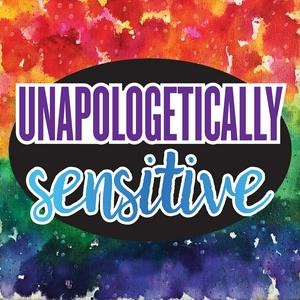
Obtenha o aplicativo gratuito radio.net
- Guardar rádios e podcasts favoritos
- Transmissão via Wi-Fi ou Bluetooth
- Carplay & Android Audo compatìvel
- E ainda mais funções
Obtenha o aplicativo gratuito radio.net
- Guardar rádios e podcasts favoritos
- Transmissão via Wi-Fi ou Bluetooth
- Carplay & Android Audo compatìvel
- E ainda mais funções


Unapologetically Sensitive
Leia o código,
baixe o aplicativo,
ouça.
baixe o aplicativo,
ouça.













